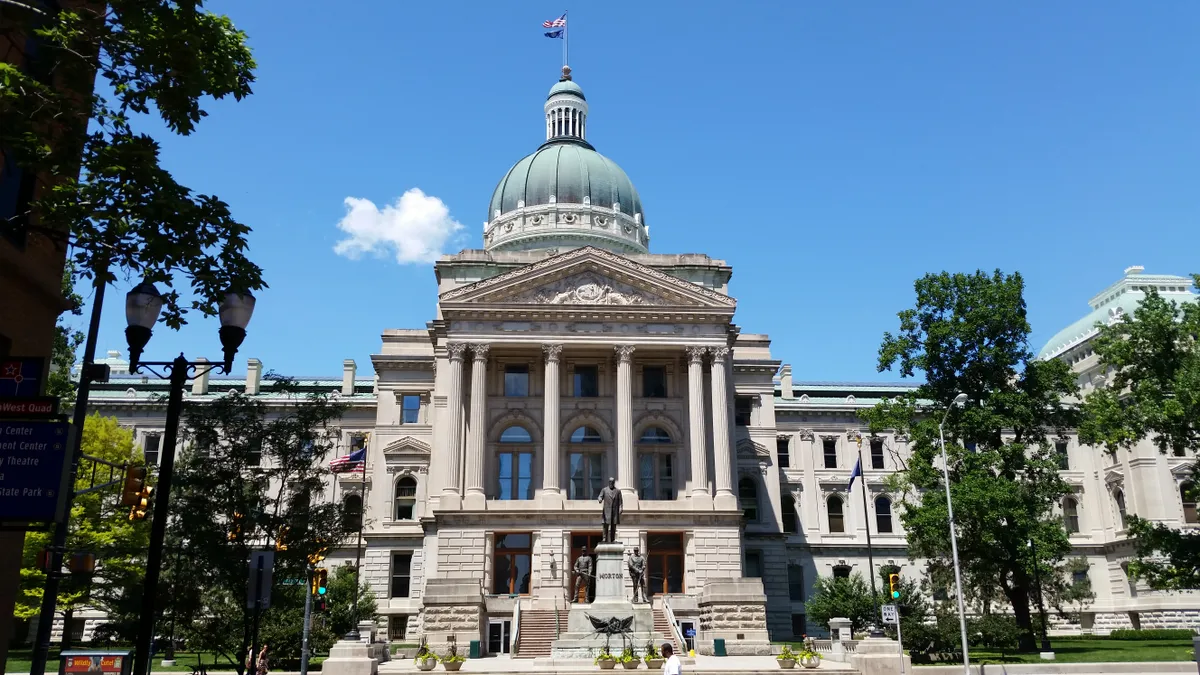UPDATE: March 5, 2020: The amended version of HB 1414 passed the Senate 37-11 on Tuesday. It heads to the conference committee on Thursday, where members of both chambers will need to agree on a final version.
Dive Brief:
-
Indiana's controversial House Bill 1414 was stripped of its most contentious language in the Senate Utilities Committee on Thursday, allowing it to pass 8-2 and move onto the Senate floor.
-
The latest iteration "takes out all the worst of it," Advanced Energy Economy Director Dylan Reed told Utility Dive. Language that would have allowed utilities to store up to 90 days of fuel supply on site was removed, and the sunset was pushed up six months to Dec. 31, 2020, around the time the state's task force is supposed to issue its recommendations for how the state should proceed on energy policy.
-
This version still slows down a utility's retirement process, mandating utilities looking to retire more than 80 MW of generation notify the Indiana Utilities Regulatory Commission (IURC) and go through a public hearing within 120 days of giving notice.
Dive Insight:
Several interests in the state were opposed to the bill. It was seen by business, consumer, environmental and clean energy groups as a way to keep more expensive resources online, rhetoric the senators likely wanted to move away from, according to Reed.
"I think this version shows that Senators are looking for a moderate approach to handling coal retirements," said Reed.
Utilities previously opposed the bill, but after today's amendments have thrown their support in the ring.
"Today’s amendment honors the utilities’ existing business decisions while respecting the integrated resource planning process, which we appreciate," Indiana Energy Association President Danielle McGrath told Utility Dive in an email. "We will continue to watch as the bill progresses through the Senate."
HB 1414 narrowly passed the House earlier this month, and was expected to face broad changes in the Senate because of strong stakeholder opposition, Democratic senators told Utility Dive earlier this week.
The latest version also lets utilities move forward with their integrated resource plans and updates portions of the bill to clarify language ensuring that coal workers who have been laid off will get priority funding from state education grants.
Coal is a hot political topic in the state — Indiana is one of the top 10 coal producers in the country and its electric utilities have begun to move away from the fuel as alternative generation like wind, solar and natural gas become more attractive. A major topic of discussion in the state's 21st Century Energy Task Force has been how to move away from coal-fired power, and what some of those risks may be.
If the bill passes the Senate, it will need to go through a Senate-Assembly conference committee for final approval. Sen. Mark Stoops, D, who serves on the task force and the Senate Utilities Committee, said whatever comes out of that committee could be drastically different.
"All kinds of strange things can happen in conference committee. They could completely strip it and then put in new language altogether," said Stoops.
Many groups fear Rep. Edmond Soliday, R, who introduced the bill and chairs the state's energy task force, will make changes in committee that revert the bill back to some of its earlier provisions.
"As amended the bill is significantly less bad, but we’re still opposed and urging senators to vote against it because it will be going back to Soliday and there is uncertainty about what shape it will ultimately take," Wendy Bredhold, Indiana senior campaign representative for the Sierra Club's Beyond Coal Campaign told Utility Dive in an email.
Consumer advocates had a similar concern.
"This isn’t over by a long shot," Kerwin Olson, executive director of Indiana Citizens Action Coalition, told Utility Dive in an email. "To be clear, this version of the bill is not the final version of the bill. It has to go back to Soliday. ... [W]e have every expectation that the author of the bill will return the bill to the House version and attempt to get that bill through both chambers during the conference committee process."
The bill moves to the Senate floor for a second reading Monday, and a final reading is set for Tuesday.















